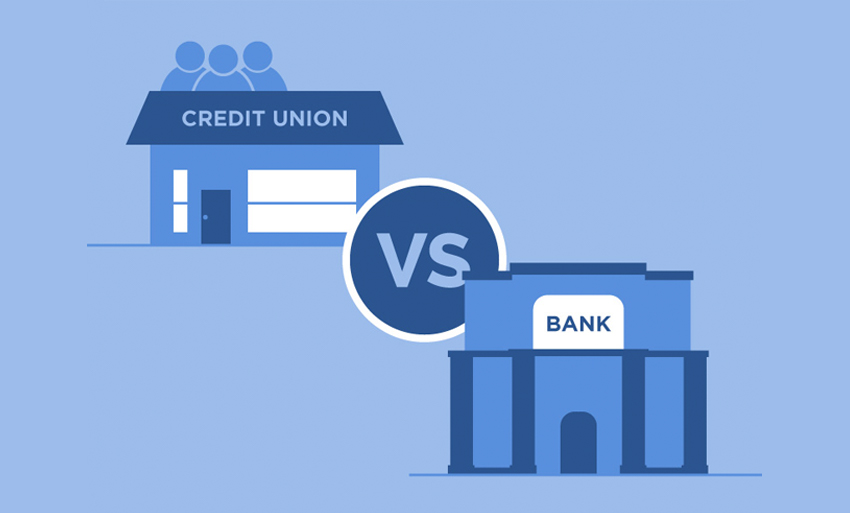
What is a major difference between retail banks and credit unions? Credit unions and retail banking share a few features that distinguish their services. But there are other aspects not being discussed that are addressed and explained. This article will help you learn about these two financial institutions, their distinctions, types, and importance.
What is the Major Difference between retail banks and credit unions?
Retail banks are profit-driven; they work with their customers and provide essential banking services, including savings accounts, loans, and checking accounts. While credit unions are created, owned, and controlled by their members without aiming for profit.
Difference between retail banks and credit union
- Retail banks only serve businesses.
- Retail banks have customers and shareholders, and they make money from their customers to please shareholders.
- Retail banks operate to earn profit.
- Retail banks only have small local branches.
- Retail banks manage a person’s money.
- banking has lower interest rates and higher charges
Difference between a credit union and retail banks
- Credit unions only serve individuals and their members.
- Credit unions have members, not shareholders.
- Credit unions are non-profit entities.
- Credit unions are nationwide.
- Credit unions focus on providing loans.
- Credit unions generally offer better customer service and fees but high-interest rates.
What is Retail Bank?
Retail banking, also known as consumer banking, provides financial services to private individuals, small businesses rather than corporations, local and central government, and other banks. The word retail is used to distinguish retail banks from investment banks.
Types of retail banking?
There are three types of retail banks:
- Community development bank: A community development bank could be term as a financial institution created to serve the sole purpose of encouraging economic growth in less affluent areas. They provide that service that includes; savings and checking accounts and loans, credit cards, etc.
- Private Banks: Private banking is the customized financial services the bank provides exclusively to its high-net-worth-individual (HNWI) clients. The services offered include investment management, banking & cash management, philanthropy advice, tax planning, and estate and trust planning.
- Postal savings bank: The postal bank is a type of retail bank that the governments operate via postal offices. It is an old method of saving used by the government to assist the poor individuals who don’t have access to banks and offer banking services to the rural areas.
Products offered by Retail Banking
Types of retail banking products include:
- Savings Accounts: These accounts help consumers check their money, save their money and earn interest on them. They have withdrawal limits following the nation’s rules in which banks operate.
- Checking or Transactional account: This type of account allows a consumer to withdraw from the money they deposited at any time. This kind of account is different from the savings account. It also accrues interest on the sum it holds and for the amount’s duration.
- Locker Service: retail banks offer their customers a locker service that allows them to store their belongings in the bank and take rent fees from them.
- Online services or mobile banking: mobile banking is an essential product in the current technology-driven world, as customers can access banks anytime, anywhere, and can transfer money with ease using their smartphones.
- Remittance services: Retail banking offer services that allow its consumer receive money sent from abroad.
- Credit and Loans: Retail banks borrow consumers interested in borrowing a loan and payback within a long period and charge them interest on these loans. Consequently, the customer benefits from the accumulated value and the bank profits through the cost of interest.
- Certificates of deposit: Retail banks offer their customers interest when they save a certain amount of money over an extended time.
- Credit/debit card:
Types of Retail Banks
Below is a list of widespread and trusted retail banks that
- JPMorgan Chase.
- Bank of America.
- Wells Fargo.
- U.S. Bank3.
- ICICI bank
- JPMC
- Citi bank
- State bank of India
- Barclays
- Standard Chartered
- HSBC
Advantages of Retail Banking
Below are a bunch of advantages you can benefit from in retail banking;
- Retail deposits are steady and form the basis of core deposits.
- They’re high in interest, and there is less room for extra bargaining interest.
- They provide a lower cost of money for banks.
- It expands the activities of the subsidiary bank.
- Retail banking leads to higher yields and better profitability of banks.
- Effective customer relationship management that includes the retail client has created a solid foundation.
- Consumer loans are believed to have greater security, less risky, and non-performing asset (NPA) perceptions.
- The retail sector is an excellent way to develop funds,
- Innovative product development credit.
- Retail banking is a way to reduce marketing efforts in a highly competitive economy.
- Retail banking helps in the country’s economic revival through increased production.
- Retail banking can improve the quality of life and help fulfill the aspirations of customers with low-cost credit.
Disadvantages of Retail Banking
The disadvantages of retail banking include;
- Making new or unique financial products is very expensive and time-consuming for banks.
- People today prefer to use online banking instead of visiting branch banks. Banks that are slow to launch new products based on technology are struggling to keep a customer who would prefer online banking.
- Customers are drawn to other financial products such as mutual funds, etc.
- Although banks invest in the latest technologies, they cannot utilize them to their fullest extent.
- Long-term loans, such as housing loans because of their extended repayment time without adequate follow-up, could turn into a non-performing asset (NPA).
- The biggest drawback is the monitoring and following up on the large number of loans, which causes banks to invest heavily within their Human Resources department.
What is Credit Union?
A credit union is a cooperative financial institution created, owned, and controlled by the people who use the credit union (members). It operates on a not-for-profit basis. Credit unions are governed by a board of directors who make decisions based on the members’ best interests.
Credit union members receive more favorable rates, terms, and conditions than other financial institutions.
What do Credit Unions Offer?
Product and services offered in credit unions include;
- savings account
- checking account
- ATM
- loans
- retirement account
Types of Credit Union
Below are a few of the most well-known types of credit unions and how they might benefit you.
- Local Credit Unions: It is designed to serve an individual resident of a specific city or county. In most cases, all that is needed to join is the residence of a defined area.
- Employer Credit Unions: employer credit unions cater to a specific business, profession, and industry. Jobs like accountants, teachers, technicians, engineers, lawyers, etc., can have their credit union.
- Federal Credit Unions: To join this kind of financial institution, you have to be a citizen of the nation or state that create this opportunity for its citizens, at least you must be 18 years or more and have a valid national ID to verify your identity
- Military Credit Unions: They are designed to meet the needs of specific members, such as loans and mortgages for veterans and military personnel.
- College Credit Unions: This financial institution is created to help students, alumni, staff, and faculty financially.
- Group Credit Unions: The group credit unions exist only for organizations eligible to become members of the institution. Mosques, churches, and other organizations are examples of members in group unions.
The Advantage of a Credit Union
The benefit provided by credit unions to their members include;
- Lower Fees: credit unions offer lower fees than banks because they are not-for-profit businesses.
- Personalized customer service: since credit union is non-profit institution, they help their members achieve their financial goal through personalized services.
- Better Savings: Credit unions offer better interest rates on their credit default swap (CDS) and savings accounts more than banks.
- Lower Loan Rates: Credit unions offer their member lower interest rates on loans. They can offer lower and better rates on loans because of their not-for-profit business model.
The Disadvantage of Credit Union?
Although credit unions have an unbeatable advantage, they also have a slight disadvantage that you must know before signing up.
You must be a member.
To benefit from the product and services offered in a credit union, you must first become a credit union member. To become a member, you must be eligible. Once you have met the eligibility requirements, you’ll be required to pay a $5 or more fee for membership when creating your account. Note: your chance of becoming a member can be terminated if you don’t live in the area of financial institutions.
There Are Limited Branches and ATMs location.
Credit unions have limited branches and ATM galleries than traditional banks. So before you plan to become a member of a credit union, you need to do thorough research about the location, mobility of the institution, and type of credit union you are willing to join.
They offer few services and products.
Credit unions offer few services and products because credit unions focus on serving their members without aiming for profit. That is why there isn’t a desire to constantly develop new services or products.
Loan Eligibility
To be eligible for a loan, you need to have saved for a long time and be a long-term member.
Not all of Them are Insured
Before you put your money, conduct a thorough investigation about the credit union you are about to use and if it is insured by the National Credit Union Administration ( NCUA).
Frequently Asked Questions (FAQs)
What is the Risk in Retail Banking?
The primary risk in retail banking include;
- credit risk
- market risk
- operational risk
How Does Retail Banking Make Money?
Banks earn money by lending funds to customers who require it for loans, overdrafts, mortgages, etc. They earn revenue from the interest earned on every loan they make to their customers.
What Does Retail Banking Do?
Retail banking provides financial services for private business owners, small businesses, individuals, and customers.
What is the Difference Between Commercial Banking and Retail Banking?
Retail banks provide their customers with standard products and services, while commercial banks tailor their products and services according to the needs of their customers.
What is the difference between investment banking and retail banking?
The difference between retail banks and investment banks is that retail banks offer credit andretail banking services for organizations, businesses, and individuals. In contrast, investment banks organize capital for individuals or companies seeking money or those interested in investing in capital markets.
Can Anyone Join a Credit Union?
Yes, but to become a member, you must meet some prerequisites. For example, you have to be in a position to pay the opening fee and provide identity documents.
Are funds saved in Credit Unions as Safe as Banks?
Yes! Funds saved in credit unions are just as banks. The body that ensures and regulates how credit unions operate is the National Credit Union Administration (NCUA). The government organized the body that insured credit unions to handle and supervise credit unions.
Is Joining a credit union a good idea?
Yes! If you join a financial institution like a credit union and you are a member, you’ll be able to benefit from its features, such as high rates of interest on the savings you make, lower fees for transactions, and lower rates for loans.
Can I get my Salary/wages paid into credit union?
Yes! If you are a government employee or a private company worker, your daily wages or monthly salary can be deposited into your credit union account with no obstruction.
How does it happen when a credit union is insolvent?
If the credit union is insured by the National Credit Union Administration ( NCUA ), the government will probably compensate the people who lose their funds.
What are the weaknesses of a credit union?
The weakness of credit unions include;
- They offer few services and products.
- Membership restriction.
- Waging of account opening fee on customers.
- Some credit unions are not insured
Conclusion
The main point is the significant difference between the retail banks and credit unions, including their types, advantages, and disadvantages. You should know the difference between retail banks and credit unions at this stage. You can always use the comment box below to ask a question.
- How To Sell Unwanted Gift Card For Cash - March 7, 2024
- Does Dunkin Take Google Pay And Apple Pay? - January 31, 2024
- Does Circle K Take Google Pay? - January 31, 2024



